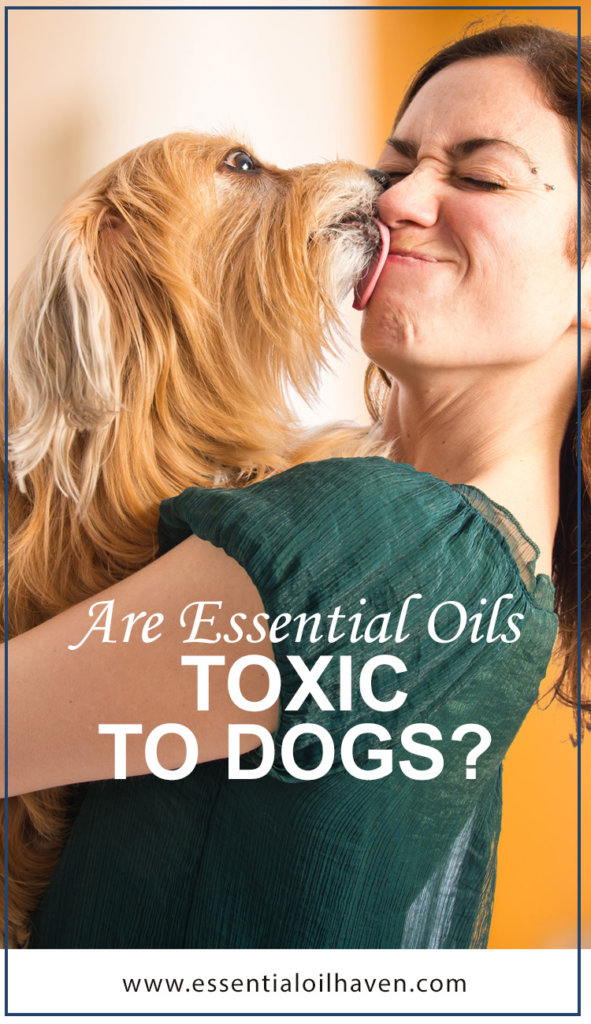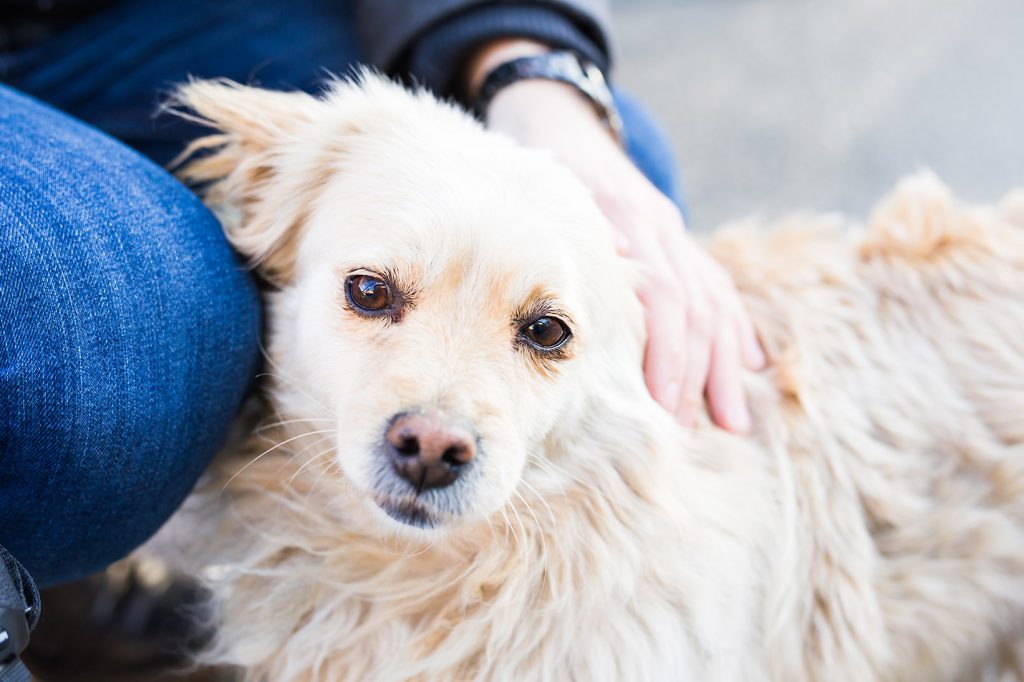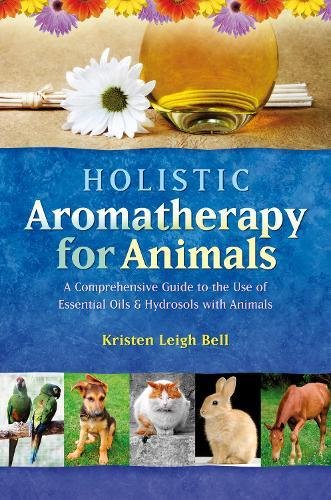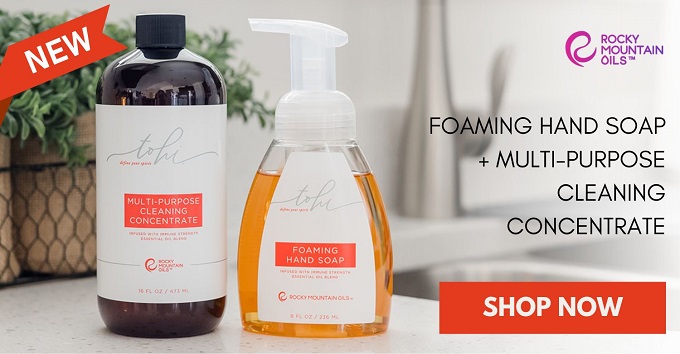
Essential oils are becoming increasingly popular and most households I know have oils around and use them in one way or another. Whether it’s for making your living room smell nice, or helping your kids focus on school work, or even cleaning your house in a more non-toxic way, essential oils and related products are everywhere! Essential oils for dogs are no exception here.
For families with dogs, your canine friend of course counts just like a family member, and you want to take care of his or her well-being just the same.
This post contains affiliate links, which means if you make a purchase through these links, I may receive a small commission at no extra cost to you. Read my full disclosure policy here.
If you’ve personally switched to more essential oils use in your life – and perhaps you diffuse it while you’re enjoying your morning cup of coffee – please consider your canine friends are also smelling the aromatherapy floating through the air if he or she is ever spending any amounts of time with you inside your home. The same is true for any pet in your home, but in this article specifically, I am addressing concerns and questions about dogs.
Here is some important information for you, about the well-being and care of safe essential oil use around your dog.
Are Essential Oils Safe for Dogs?
IF you follow these simple 3 rules, then YES, you can use essential oils around dogs:
- KNOW YOUR PET’s HEALTH STATUS – CHECK WITH YOUR VET. Your veterinarian knows the medical history of your dog, and any current issues or ongoing treatments. Before your start any aromatherapy around your dog, be sure to consult with your vet and let him know that you plan to try essential oil home remedies on your furry friend. Be sure you also refresh your own memory of any history of surgeries or other major health issues that may affect your pet still to this day.
- LESS IS MORE. If you’ve determined that yes indeed, your pet is generally healthy and happy, and you want to try aromatherapy, start conservative. Actually, start super conservative, as dogs are more sensitive to essential oils than humans. Also take into account the size of your dog. With smaller dogs, use a smaller amount (less drops), than on larger dogs. Also, use a super small amount on puppies and senior dogs. A great way to start using essential oils with your dog is to actually use the hydrosol products of essential oils. They are a water-based byproduct of the steam distillation of essential oils. As such, they contain the same therapeutic properties as the essential oil distilled, but it’s not in the concentration or strength of the actual essential oil. Hydrosols as such would then count as already diluted essential oils.
- ALWAYS DILUTE. Be gentle on your pet and its new path to aromatherapy. To avoid the full power and strength of any essential oil, always make sure that you dilute it first before use. This can be using carrier oils for topical application, or diluting with a cold-mist essential oil diffuser for use through the air of the room you’re in.
Under no circumstance should your dog ever eat or ingest essential oils. Oral ingestion of essential oils leads to rapid absorption of them through the mucus membranes inside the mouth, and get further metabolized through the liver. Very young dogs and puppies especially are even more sensitive to these potentially toxic effects.
Dr. Janet Roark, the “Essential Oil Vet”, adds the following good precaution tips about using essential oils with your dog (she also makes those rules applicable to cats):
- Do not use essential oils around your pet’s eyes, ears, nose, or genitals area.
- Use extra caution around pregnant or nursing pets.
Most Important Tips When Using Essential Oils for Dogs
I made this list as a quick go-to guide for using oils with your sweet pup:
- Always dilute essential oils before use.
- Do not put essential oils into your pet’s drinking water or food. Absolutely no internal use of essential oils for dogs.
- Try to only use them when you want to address a specific concern. Avoid using essential oils on your dog as a “preventative” measure.
- Do not use essential oils around puppies less than 10 weeks old.
- Check with a holistic veterinarian if you plan to use essential oils on a dog that’s pregnant. Especially, absolutely avoid stimulating oils (such as tea tree, peppermint, or rosemary) on pregnant dogs.
- Don’t use essential oils on dogs who are prone to seizures, or are suffering epilepsy.
- Use a good quality essential oil brand – no junk!
Want to learn more? Check out this amazing book “Holistic Aromatherapy for Animals” by Kristen Leigh Bell. Around $15 and available on Kindle and in Paperback.
Are Essential Oil Diffusers Safe Around Dogs?
Having explored the essential oil safety issues around pets above, you can say that in general yes, the use of essential oil diffusers is safe around dogs. That said though, you need to take caution in the selection of oils you choose to diffuse when your pet is around. Some oils
Essential Oils To Use With Dogs
I’ve included a list of the best 12 essential oils that experts say are safe to use on animals. There are plenty more so please find the full list here.
- Lavender: An all-purpose superstar used to relax, fight inflammation, burns, cuts and bruises. Can also help with car sickness or car ride anxiety.
- Chamomile (both Roman and German): Anti-inflammatory, gentle non-toxic. Good for nausea, allergic reactions or skin irritations.
- Thyme: Helps with pain relief, arthritis, or rheumatism. Excellent for skin issues and other infections.
- Spearmint: Helps with nausea or diarrhea.
- Peppermint: Treating strains, sprains and arthritis.
- Cardamom: Helps to normalize appetite, can support weight loss. Anti-bacterial so also good for heartburn and nausea.
- Cedarwood: For flea control.
- Lemongrass: Repels ticks and fleas, and can also improve your dog’s skin condition.
- Eucalyptus: Helps control fleas and other parasites, and soothes after insect bites or rashes.
- Frankincense: For wound care, antibacterial healing and behavior improvements.
- Clary Sage: Helps to calm a dogs’ nerves.
- Cardamom: Aids a dog’s nausea.
I would think that if these oils are good to help dogs with certain ailments directly, then they’d definitely be ok to diffuse around them, too.
Essential Oils To Avoid Around Dogs
To be the best human that you can be for your pet, please absolutely avoid diffusing the following oils around your canine friend:
- Citrus oils such as lemon, orange, or tangerine
- Tea tree
- Ylang ylang
- Cinnamon
- Pennyroyal
- Pine
- Sweet Birch
- Wintergreen
Further, I’d like to refer you to a fantastic little booklet that’s available on Kindle for under $5, titled, Aromatherapy for Dogs by Julie Summers. If you want to score this for FREE, sign up for a Kindle Unlimited Membership Plan, in which case this book will be included and you can try it out completely free for the first month.
This little book offers great explanations, recipes and information for a dog owner interested in aromatherapy.
How Can Aromatherapy Help Your Pet?

Dogs can benefit from the natural power of essential oils.
Like humans, dogs may also suffer from an array of issues that you’d like to address on his or her behalf. They cannot take care of themselves, hence it’s their owners job to maintain a check on things that are indispensable for a happy and healthier dog. If you’ve learned some good aromatherapy tricks that work on us as humans, you may want to consider to also treat your dog to more well-being in the most natural way.
Essential Oils for Weight Loss in Dogs
Some dogs just require a stricter diet and workout regime to keep a wholesome physique, which is something your vet can further inform you on if that’s the matter. Or perhaps you just have a large breed of dog – in which case it’s not weight loss that you’re really needing to look at. Dogs with over 50 lbs of weight are generally termed as the large dogs. A dog may develop intolerance to foods they’ve been eating for many decades.
Use Cardamom Essential Oil in your diffuser to aid weight loss in your dog.
Anxiety in Dogs
While dogs have been domesticated by men and women for quite a long time, it’s important to remember that they are still animals with an extremely strong instinct for fight or flight when danger is present. That said, many dogs actually suffer mild anxiety and can get quite worked up – especially in unfamiliar or uncomfortable situations such as car rides, meeting strangers, or other dog socialization anxieties.
Calming Your Dog with Essential Oils
Dogs bark, and that’s ok. As dogs way of communication is simply barking, it isn’t advised to ignore the barking for a longer duration of time. They bark for a reason and it’s sometimes not totally simple to work out the reason especially if you’re not an expert, trainer or a veterinary doctor. Although they can understand a surprising amount of verbal and body language, dog psychology and the way they process information is quite different from us humans.
There are several reasons behind your dogs’ barking and it’s very much important to notice and recognize the reason behind the activity. Even in the event the dog looks impossible to calm down, don’t stop trying. Most dogs will calm down as soon as they adjust to the change in your own energy, if given a couple of minutes to adjust themselves.
In the majority of instances, female dogs with puppies are frequently quite protective and could injure a man or woman attempting to interact with their puppies. Notice this dog’s state of mind and be respectful to the situation.
What Do You Think?
Calling on all dog owners and other pet specialists… what do you think? Have you tried holistic aromatherapy on your pet? Did it work? Please let us know in the comments below.
Resources
- Essential Oil and Liquid Potpourri Poisoning in Dogs from vcahospitals.com






John Wayne advertised cigarettes for years with “no noticeable side-effects”. I’ve had friends tell me they feed chocolate to their dogs and they love it. How many of us know what chocolate (yes even milk) can have a deadly effect on dogs? Bottom line, if you aren’t certain error on they side of safety. As for those who think Tea Tree oil is safe for use on dogs… hopefully you don’t have a cat. Don’t find out the way we did.
I disagree to some extent as I’ve used both tea tree & rosemary essential oils on my dog to get a few warts under control with no issues. I also work with essential oils with our dog at home with no issues. FYI for those who may be concerned about this subject. Another FYI: fragrance oils are NOT essential oils, nowhere near the same thing, so avoid like the plague, for both yourself, your family, and your animals. Fragrance oils are nothing but poison.
I do use citrus essential oils in certain natural cleaners I make with no issues for our dog either.
I’ve seen aloe recommended on supposed ‘respected’ pet advice sites mixed with essential oils, which I’d very much recommend caution with as the aloe caused our dog to vomit foam after licking his paw. Used the same essential oils a week later with no issues, so it’s definitely aloe. Hydrosols of any type have never negatively affected our dog.
I’d be extra concerned regarding the cleaning products you use however, as dogs are right at floor level, sleep on the floor, lick it, drop their food on it etc. We switched to a heavy duty steam mop which uses only water, no stinky pre-soaked mopping pads that reek of synthetic fragrances such as the most horrible ‘lavender’ fragrance I’ve ever smelled, to avoid his being exposed to toxic petroleum byproducts, and only use other non-toxic cleaners like baking soda etc around the house.
The inside of an aloe vera plant contains two parts. The center of the plant, which is green and aqueous, is safe to use. However, the outer edges called the latex is toxic for animals. Most aloe products, like aloe vera gel, do not contain this latex.
Thank you !
worked with Ananda Apothecary’s pet blend on my Siberian Husky using essential oils. Works amazingly for her anxiety.
Love :)
Peppermint, applied on my dog for years, has never hurt him.
Thank you very much for your helpful tips here!!!
The best way to help any dogs paw..whether it be for arthritis or cut or dry cracked paws …especially for dogs who live with snow and salts on the streets and sidewalks…use 1 to 2 cups of epsom salt and let dog soak all 4 paws for 10 min. ..this will clear any bacteria and soften dogs paws at same time as well as helping the pains of arthritis. .this I used for over 4 yrs for my senior dog and this treatment kept any infections from ripped nail and arthritis. ..this made my corgi last few years very happy with us
Hi. Thanks very much for all this info it helped a lot. My problem today though is my dogs paw has to be washed as it is irritated after being in a bandage for a week. I wanted to use lavender as a disinfectant but am afraid of what will happen if she licks her paw after treatment.
Any advise. I don’t want to have to protect it so that the paw stays dry.
Bye
Christelle.
Christelle: get some Povidone Iodine solution and pour in an old bowl, add warm water till it looks like weak tea. you can soak the paw ( in my case it was all paws) be sure to dry inbetween the toes. this will disinfectant and help the healing. been doing this along time. It is safe. I also use very good oils but can not get myself to put them on my animals for fear of them licking and you and i both know some are very hot to the taste.
Ive been told NEVER to use peppermint or eucalyptus around dogs. Aren’t they similar to spearment and tea tree?
We use thieves essential oils for cleaning. Is that safe for our golden doodles? (You mentioned that cinnamon was not good, and I know thieves has cinnamon in it.)
You say that essential oils are pretty much safe around dogs as long as you dilute but then list around 8 oils never to diffuse around your dog.
Why? Will these oils irritate dogs or make them sick or what?
your comment about not using mandarin oil around dogs is not correct as I have looked at several dog sites and vet sites who say that mandarin oil in a oil diffuser is completely safe and helps nervous dogs.